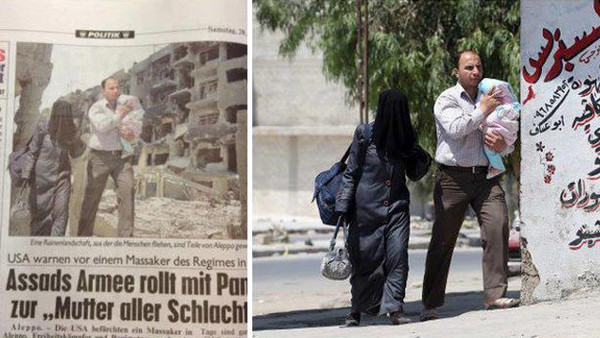26 sept 2012
Six Palestinian refugees die in Syria
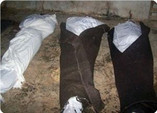
Six Palestinian refugees were killed, on Wednesday, in the Syrian capital Damascus and the cities of Aleppo and Hums, Palestinian sources in Syria reported.
The six were killed execution style; four of them were reportedly killed at a roadblock near Aleppo, while two were killed in their homes, the Coordination Committee in Al-Yarmouk Refugee Camp in Syria confirmed.
The Committee identified the casualties as Raed Hajjouj, Ammar Abbas, Hussein Al-Masry, Mohammad Al-Gada, Hikmat Dirbaas, and Hassan Salaima. Their bodies carried clear marks of torture.
Hundreds of Palestinian casualties have been reported since the revolution started in Syria in March of 2011.
The six were killed execution style; four of them were reportedly killed at a roadblock near Aleppo, while two were killed in their homes, the Coordination Committee in Al-Yarmouk Refugee Camp in Syria confirmed.
The Committee identified the casualties as Raed Hajjouj, Ammar Abbas, Hussein Al-Masry, Mohammad Al-Gada, Hikmat Dirbaas, and Hassan Salaima. Their bodies carried clear marks of torture.
Hundreds of Palestinian casualties have been reported since the revolution started in Syria in March of 2011.
20 sept 2012
PLO: 18 Palestinians killed in Damascus
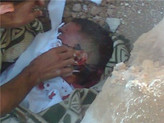
At least 18 Palestinians were killed Thursday and their bodies displayed publicly in Damascus, PLO officials in the capital's largest refugee camp said.
The PLO office in Yarmouk said the Syrian regime "committed a massacre" against Palestinians in the camp. Bodies were found mutilated and charred, it said.
PLO secretary-general Yasser Abed Rabbo denounced the killings.
"We reject any justification or allegations invoked by the Syrian regime army about this massacre which includes torture, killing, and assassination,"Abed Rabbo said.
"Moreover, such types of crimes need to be condemned internationally. Syria faces unprecedented massacres against Syrian people as well as Palestinians," he said.
Thursday's killings were the latest in a string of attacks targeting Palestinians. At least 10 refugees were killed in the Yarmouk a day earlier, activists in the camp reported.
An activist in Yarmouk, where rebels have been hiding out in recent days, said tanks and soldiers had sealed all the entrances. Hundreds of soldiers were searching the area on foot and on trucks mounted with heavy machine guns.
"We are trapped here. Only children and older men or women can leave. Young men, who could be rebels or activists, and even young women, who could also be activists, are stuck inside," an activist called Abu Salam told Reuters on Skype.
"We are hiding in our homes. I am afraid to leave the house so I am sitting here waiting to see if they reach my street, if I will be arrested or shot dead," he said.
He said at least three people, two men and a young women, were shot dead when soldiers saw them running out of a park on Thursday morning. Another five rebels found hiding out in the area were executed, he said.
The campaign is the latest step in an effort by state forces to stamp out a presence in the Syrian capital of insurgents who are fighting to topple President Bashar Assad.
A resident who toured Yarmouk a day earlier said rebel fighters, who have been flushed out of many surrounding districts, had pulled into a southern section of the district and come under intense army bombardment overnight.
Activists and witnesses who spoke to Reuters say that many parts of the districts in Damascus's southern outskirts, where insurgents have been trying to maintain a foothold, have been reduced to rubble.
They said entire buildings had collapsed and the stench of decaying bodies filled the streets. "We are too afraid to go get them because security forces are there and will ask why we are coming for these people," said Abu Salam.
Yarmouk is an unofficial camp for Palestinian refugees. The densely populated, impoverished district in southern Damascus is packed with concrete buildings.
This summer, many districts of southern Damascus became a daily battleground in an 18-month-old popular revolt against Bashar Assad that has escalated into civil war.
Syrian state television said 100 people had been arrested in Yarmouk, and said its forces searching another nearby district were "raiding terrorists dens" and had killed several people inside them.
Assad's supporters say they are not facing homegrown opposition but rather militants funded from abroad.
The PLO office in Yarmouk said the Syrian regime "committed a massacre" against Palestinians in the camp. Bodies were found mutilated and charred, it said.
PLO secretary-general Yasser Abed Rabbo denounced the killings.
"We reject any justification or allegations invoked by the Syrian regime army about this massacre which includes torture, killing, and assassination,"Abed Rabbo said.
"Moreover, such types of crimes need to be condemned internationally. Syria faces unprecedented massacres against Syrian people as well as Palestinians," he said.
Thursday's killings were the latest in a string of attacks targeting Palestinians. At least 10 refugees were killed in the Yarmouk a day earlier, activists in the camp reported.
An activist in Yarmouk, where rebels have been hiding out in recent days, said tanks and soldiers had sealed all the entrances. Hundreds of soldiers were searching the area on foot and on trucks mounted with heavy machine guns.
"We are trapped here. Only children and older men or women can leave. Young men, who could be rebels or activists, and even young women, who could also be activists, are stuck inside," an activist called Abu Salam told Reuters on Skype.
"We are hiding in our homes. I am afraid to leave the house so I am sitting here waiting to see if they reach my street, if I will be arrested or shot dead," he said.
He said at least three people, two men and a young women, were shot dead when soldiers saw them running out of a park on Thursday morning. Another five rebels found hiding out in the area were executed, he said.
The campaign is the latest step in an effort by state forces to stamp out a presence in the Syrian capital of insurgents who are fighting to topple President Bashar Assad.
A resident who toured Yarmouk a day earlier said rebel fighters, who have been flushed out of many surrounding districts, had pulled into a southern section of the district and come under intense army bombardment overnight.
Activists and witnesses who spoke to Reuters say that many parts of the districts in Damascus's southern outskirts, where insurgents have been trying to maintain a foothold, have been reduced to rubble.
They said entire buildings had collapsed and the stench of decaying bodies filled the streets. "We are too afraid to go get them because security forces are there and will ask why we are coming for these people," said Abu Salam.
Yarmouk is an unofficial camp for Palestinian refugees. The densely populated, impoverished district in southern Damascus is packed with concrete buildings.
This summer, many districts of southern Damascus became a daily battleground in an 18-month-old popular revolt against Bashar Assad that has escalated into civil war.
Syrian state television said 100 people had been arrested in Yarmouk, and said its forces searching another nearby district were "raiding terrorists dens" and had killed several people inside them.
Assad's supporters say they are not facing homegrown opposition but rather militants funded from abroad.
Hamas condemns attacks on Palestinian refugee camps in Syria
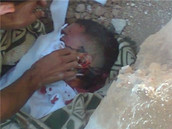
Hamas condemned attacks targeting Palestinian refugee camps in Syria, calling for the Palestinian refugees not to be used in the Syrian crisis.
A statement issued by the information office of the movement in the aftermath of Wednesday attack on the Yarmouk refugee camp in Damascus which resulted in the killing of 18 Palestinian refugees said: “We in Hamas stress our rejection and condemnation of targeting Palestinian refugee camps and call again for not forcing the refugee camps into the Syrian crisis."
“While we express our pain at the shedding of Palestinian blood, we express our pain and condemnation of the continued targeting and shedding of Syrian people’s blood," the statement said.
A statement issued by the information office of the movement in the aftermath of Wednesday attack on the Yarmouk refugee camp in Damascus which resulted in the killing of 18 Palestinian refugees said: “We in Hamas stress our rejection and condemnation of targeting Palestinian refugee camps and call again for not forcing the refugee camps into the Syrian crisis."
“While we express our pain at the shedding of Palestinian blood, we express our pain and condemnation of the continued targeting and shedding of Syrian people’s blood," the statement said.
|
|
Syria: A photoshopped "revolution"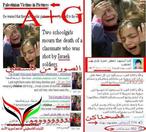
Hany Farid, a professor at Dartmouth College, has built a career and a reputation as a leading researcher in digital image forensics. He has made software tools for a number of impressive projects in recent years.
One was a pixel-sleuthing program to detect how much fashion photographs have been burnished with Adobe's Photoshop editing program to remove wrinkles and flab, while plumping up lips and breasts. Another was software for the automated detection of child pornography on the Web to help law enforcement agencies. Mr. Farid has worked with government agencies and companies, but these collaborations have typically been for individual projects. "Research is critical," Mr. Farid said. "But unless you put your ideas into a product, the impact is limited." Mr. Farid is hoping to broaden the reach of his work as co-founder and chief technology officer of a start-up company, Fourandsix Technologies, which is being announced on Tuesday. [...] At a company whose key product has been transmuted into a verb - "to photoshop" - that means to doctor pictures, the technology to authenticate images was not a priority. |
At a glance, Fourandsix seems to be in the Photoshop-busting business. Mr. Connor does not see it that way. Photoshop, he said, is "a great tool" - and one that is only misused at times. [...] In law enforcement and photojournalism, Mr. Connor said, there is a clear need for the start-up's product. "There is a business here," he said. "But the open question is what size of a business is it?"
The initial product is for professionals, priced at $890 with an annual fee for updates to the database of digital signatures.
Photoshop and the Syrian crisis
The initial product is for professionals, priced at $890 with an annual fee for updates to the database of digital signatures.
Photoshop and the Syrian crisis
|
One of the most famous examples of photoshopping during the ongoing foreign-orchastrated Syrian crisis is the photo which appeared in Austria’s largest newspaper Kronen Zeitung on July 28 when readers were treated to the image on the left of bombed out Aleppo.
The original photo on the right came from the European Pressphoto Agency and shows a Syrian family that was or wasn’t fleeing for the violence – but the Zionist media moguls apparently needed a more apocalyptic background to communicate their propaganda message against the Syrian government. |
In numerous other cases photos of former war zones are used by the media as a propaganda tool in their anti-Assad campaign while photos of pro-government demonstrations in a Hollywood-esque way have been changed into photos of anti-government protestors.
More photoshop propaganda can be watched here and here
Syria: A photoshopped "revolution"
Hany Farid, a professor at Dartmouth College, has built a career and a reputation as a leading researcher in digital image forensics. He has made software tools for a number of impressive projects in recent years. One was a pixel-sleuthing program to detect how much fashion photographs have been burnished with Adobe's Photoshop editing program to remove wrinkles and flab, while plumping up lips and breasts. Another was software for the automated detection of child pornography on the Web to help law enforcement agencies.
Mr. Farid has worked with government agencies and companies, but these collaborations have typically been for individual projects. "Research is critical," Mr. Farid said. "But unless you put your ideas into a product, the impact is limited."
Mr. Farid is hoping to broaden the reach of his work as co-founder and chief technology officer of a start-up company, Fourandsix Technologies, which is being announced on Tuesday.
The company's president and other founder is Kevin Connor, who spent 15 years at Adobe. He was vice president of product management for Photoshop until last year, when he left to join Mr. Farid. At Adobe, Mr. Connor said, he was familiar with Mr. Farid's research, and Adobe engineers often cooperated with the Dartmouth scientist.
But at a company whose key product has been transmuted into a verb - "to photoshop" - that means to doctor pictures, the technology to authenticate images was not a priority.
At a glance, Fourandsix seems to be in the Photoshop-busting business. Mr. Connor does not see it that way. Photoshop, he said, is "a great tool" - and one that is only misused at times.
The core market for its first product, Mr.Connor said, will be law enforcement agencies and news organizations, where the authenticity of a photograph spells the difference between the truth and a lie. The Department of Homeland Security and the Associated Press were among the beta testers.
Fourandsix's downloadable software, FourMatch, determines the likelihood that an image has been altered by comparing the digital "signature" of an image with a database of more than 70,000 known signatures for cameras, smartphones, software and online services, from social networks like Facebook to photo-storing sites like Picasa. The software tells the user if an image matches a known signature or has been modified by software and can suggest how extensive the alteration may have been. FourMatch works as an extension to Photoshop.
The many signatures arise from the malleability of the JPEG standard, the format in which nearly all cameras save images. Different cameras and mobile devices have varying sensor sizes and resolution settings, and techniques for handling thumbnail pictures and image metadata. Different cameras and software use different methods to compress image files. All leave telltale digital tracks.
Fourandsix has certainly adhered to the lean start-up ethos so popular in Silicon Valley these days. It has not yet sought outside financing. Its founders are the company's only employees so far. And, like so many software start-ups, the company runs in the cloud, using Amazon Web Services and Google Apps. Fourandsix will look to add office space as it adds people, but its nominal headquarters is now Mr. Connor's house in San Jose.
In law enforcement and photojournalism, Mr. Connor said, there is a clear need for the start-up's product. "There is a business here," he said. "But the open question is what size of a business is it?"
The initial product is for professionals, priced at $890 with an annual fee for updates to the database of digital signatures.
Other markets for future products, Mr. Connor said, probably include health care, to verify the authenticity of medical images used in research and for billing. Another place the technology might be employed is e-commerce, where smartphone images are beginning to be used to make transactions in mobile payment systems.
And forensic-image technology, its founders say, may someday be used in social media by a broad consumer audience - a sort of reality filter for images on the Web: "What can be believed or not in all these photos flying around," observed Mr. Connor, whose business card carries the start-up's tagline, "Photographic Truth."
More photoshop propaganda can be watched here and here
Syria: A photoshopped "revolution"
Hany Farid, a professor at Dartmouth College, has built a career and a reputation as a leading researcher in digital image forensics. He has made software tools for a number of impressive projects in recent years. One was a pixel-sleuthing program to detect how much fashion photographs have been burnished with Adobe's Photoshop editing program to remove wrinkles and flab, while plumping up lips and breasts. Another was software for the automated detection of child pornography on the Web to help law enforcement agencies.
Mr. Farid has worked with government agencies and companies, but these collaborations have typically been for individual projects. "Research is critical," Mr. Farid said. "But unless you put your ideas into a product, the impact is limited."
Mr. Farid is hoping to broaden the reach of his work as co-founder and chief technology officer of a start-up company, Fourandsix Technologies, which is being announced on Tuesday.
The company's president and other founder is Kevin Connor, who spent 15 years at Adobe. He was vice president of product management for Photoshop until last year, when he left to join Mr. Farid. At Adobe, Mr. Connor said, he was familiar with Mr. Farid's research, and Adobe engineers often cooperated with the Dartmouth scientist.
But at a company whose key product has been transmuted into a verb - "to photoshop" - that means to doctor pictures, the technology to authenticate images was not a priority.
At a glance, Fourandsix seems to be in the Photoshop-busting business. Mr. Connor does not see it that way. Photoshop, he said, is "a great tool" - and one that is only misused at times.
The core market for its first product, Mr.Connor said, will be law enforcement agencies and news organizations, where the authenticity of a photograph spells the difference between the truth and a lie. The Department of Homeland Security and the Associated Press were among the beta testers.
Fourandsix's downloadable software, FourMatch, determines the likelihood that an image has been altered by comparing the digital "signature" of an image with a database of more than 70,000 known signatures for cameras, smartphones, software and online services, from social networks like Facebook to photo-storing sites like Picasa. The software tells the user if an image matches a known signature or has been modified by software and can suggest how extensive the alteration may have been. FourMatch works as an extension to Photoshop.
The many signatures arise from the malleability of the JPEG standard, the format in which nearly all cameras save images. Different cameras and mobile devices have varying sensor sizes and resolution settings, and techniques for handling thumbnail pictures and image metadata. Different cameras and software use different methods to compress image files. All leave telltale digital tracks.
Fourandsix has certainly adhered to the lean start-up ethos so popular in Silicon Valley these days. It has not yet sought outside financing. Its founders are the company's only employees so far. And, like so many software start-ups, the company runs in the cloud, using Amazon Web Services and Google Apps. Fourandsix will look to add office space as it adds people, but its nominal headquarters is now Mr. Connor's house in San Jose.
In law enforcement and photojournalism, Mr. Connor said, there is a clear need for the start-up's product. "There is a business here," he said. "But the open question is what size of a business is it?"
The initial product is for professionals, priced at $890 with an annual fee for updates to the database of digital signatures.
Other markets for future products, Mr. Connor said, probably include health care, to verify the authenticity of medical images used in research and for billing. Another place the technology might be employed is e-commerce, where smartphone images are beginning to be used to make transactions in mobile payment systems.
And forensic-image technology, its founders say, may someday be used in social media by a broad consumer audience - a sort of reality filter for images on the Web: "What can be believed or not in all these photos flying around," observed Mr. Connor, whose business card carries the start-up's tagline, "Photographic Truth."
Page: 2 - 1
